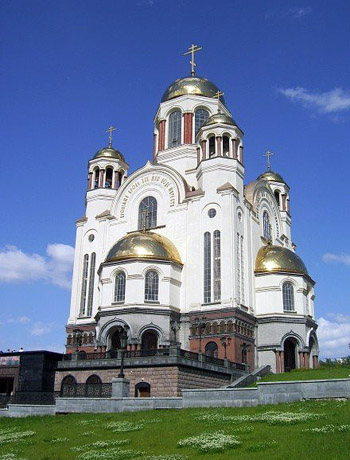While many people have heard of Chechnya and the unrest that has been present there since 1990, the tales of what has happened in the other areas of the former Soviet Union as they have fragmented off from the "mother country" are not all tales of great success stories. Ethnic discord, violence, corruption seem to have cropped up everywhere. There was nothing tidy about the break-up of the Soviet Union, and while some of the "revolutions" have been designated with colorful names such as the rose revolution, the orange revolution, etc., the real color in most of these cases has been red. If you are interested in the specific details of the break-up of the Soviet Empire, see the nicely-done wiki entry on the Dissolution of the Soviet Union, which covers what happened from from 1985 to 2002 under Gorbachev. (Actually, that can be summed up in one word; chaos.)
But the chaos is not confined only to the separatist regions. As described in the Sheets book, there is Chernobyl, which is kind of an alien land unto itself, and there is life in the Russian cities with problems of public infrastructure, alcohol, and drugs--not much different than life in the U.S. See, for example, Jeff Tayler's article in The Atlantic, Russian Hangover: A Moscow apartment block's tenants turn over, one vodka binge at a time.
As a scholar of Russian history, but not necessarily a commentator on current events in Russia, it has been difficult for me to keep track of all that has gone on in Russian and all the regions of the former Soviet Union, I am well aware of the violence that has continued to plague some of the regions, and I remain aware of the political uncertainties in these areas. While the Baltic countries are free and happy, Belarus is controlled by an oppressive dictatorship; Ukraine has struggled because of its dependence on natural gas from Russia; Azerbaijan possessed oil reserves, while Georgia does not; there are problems everywhere. This Sheets book gives you an eyewitness account of many of those problems.
Lawrence Sheets, the author of Eight Pieces of Empire, answered a few questions for me about recent Russian history.
Here are some other items that you might wish to read:
- "A Smuggler's Story"; Lawrence Scott Sheets' article on Uranium Smuggling
- Sheet's short biography and information
- Review of the Pieces of 8 book by David Schribman of the Boston Globe; there are quite a few other reviews available online.
